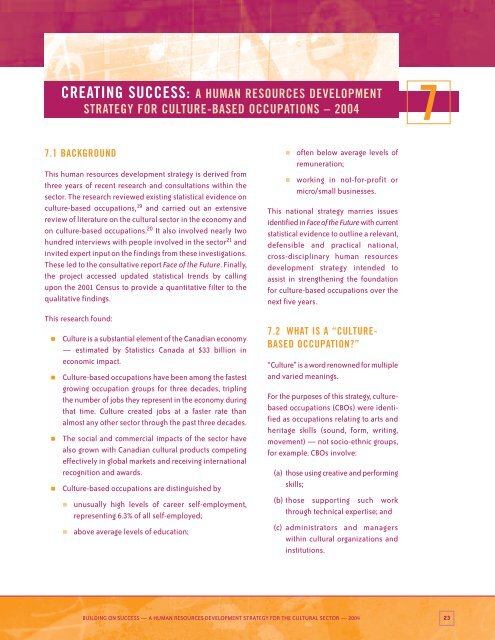Full document
Full document
Full document
You also want an ePaper? Increase the reach of your titles
YUMPU automatically turns print PDFs into web optimized ePapers that Google loves.
CREATING SUCCESS: A HUMAN RESOURCES DEVELOPMENT<br />
STRATEGY FOR CULTURE-BASED OCCUPATIONS – 2004<br />
7<br />
7.1 BACKGROUND<br />
This human resources development strategy is derived from<br />
three years of recent research and consultations within the<br />
sector. The research reviewed existing statistical evidence on<br />
culture-based occupations, 19 and carried out an extensive<br />
review of literature on the cultural sector in the economy and<br />
on culture-based occupations. 20 It also involved nearly two<br />
hundred interviews with people involved in the sector 21 and<br />
invited expert input on the findings from these investigations.<br />
These led to the consultative report Face of the Future. Finally,<br />
the project accessed updated statistical trends by calling<br />
upon the 2001 Census to provide a quantitative filter to the<br />
qualitative findings.<br />
This research found:<br />
• Culture is a substantial element of the Canadian economy<br />
— estimated by Statistics Canada at $33 billion in<br />
economic impact.<br />
• Culture-based occupations have been among the fastest<br />
growing occupation groups for three decades, tripling<br />
the number of jobs they represent in the economy during<br />
that time. Culture created jobs at a faster rate than<br />
almost any other sector through the past three decades.<br />
• The social and commercial impacts of the sector have<br />
also grown with Canadian cultural products competing<br />
effectively in global markets and receiving international<br />
recognition and awards.<br />
• Culture-based occupations are distinguished by<br />
• unusually high levels of career self-employment,<br />
representing 6.3% of all self-employed;<br />
• above average levels of education;<br />
• often below average levels of<br />
remuneration;<br />
• working in not-for-profit or<br />
micro/small businesses.<br />
This national strategy marries issues<br />
identified in Face of the Future with current<br />
statistical evidence to outline a relevant,<br />
defensible and practical national,<br />
cross-disciplinary human resources<br />
development strategy intended to<br />
assist in strengthening the foundation<br />
for culture-based occupations over the<br />
next five years.<br />
7.2 WHAT IS A “CULTURE-<br />
BASED OCCUPATION?”<br />
“Culture” is a word renowned for multiple<br />
and varied meanings.<br />
For the purposes of this strategy, culturebased<br />
occupations (CBOs) were identified<br />
as occupations relating to arts and<br />
heritage skills (sound, form, writing,<br />
movement) — not socio-ethnic groups,<br />
for example. CBOs involve:<br />
(a) those using creative and performing<br />
skills;<br />
(b) those supporting such work<br />
through technical expertise; and<br />
(c) administrators and managers<br />
within cultural organizations and<br />
institutions.<br />
BUILDING ON SUCCESS — A HUMAN RESOURCES DEVELOPMENT STRATEGY FOR THE CULTURAL SECTOR — 2004 23










